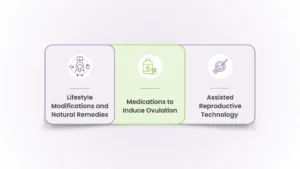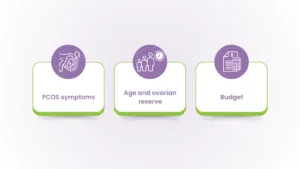Advancements in fertility treatment for PCOS have made motherhood achievable for many women dealing with polycystic ovary syndrome (PCOS). With the right approach, personalized care, and professional guidance, women with PCOS can overcome fertility challenges and achieve their dreams of starting a family. Learning PCOS-related fertility challenges and insights into the fertility treatment options for PCOS that are now available can make a world of difference in your family-building journey.
PCOS and Its Impact on Fertility
PCOS is a hormonal disorder that affects millions of women worldwide. It is characterized by irregular menstrual cycles, elevated levels of male hormones, and the presence of multiple small cysts on the ovaries. These hormonal imbalances can disrupt ovulation, making conception more difficult.
While PCOS can impact fertility, it is not an impossible obstacle. With tailored treatments and lifestyle changes, many women successfully conceive and deliver healthy babies.
Fertility Challenges Associated with PCOS
One of the main challenges of PCOS is irregular or absent ovulation, which reduces the likelihood of natural conception. Ovulation is a critical part of the reproductive process, and without the regular release of eggs, achieving pregnancy can become difficult or even impossible without intervention. Despite these obstacles, there are numerous PCOS treatment for fertility options designed to address these issues and improve the chances of conception.
In addition to ovulation challenges, women with PCOS may face other reproductive hurdles, such as:
- Thickened ovarian walls: This condition, also known as ovarian hyperstimulation, can make it harder for eggs to mature and be released during ovulation. The thickened walls may prevent follicles from rupturing, leading to a build-up of undeveloped eggs within the ovaries.
- Poor egg quality due to hormonal imbalances: Hormonal fluctuations associated with PCOS, such as elevated androgens and irregular estrogen levels, can affect the development and health of eggs. This can lead to lower fertilization rates and reduced embryo quality, impacting the chances of a successful pregnancy.
- Increased risk of insulin resistance: A common feature of PCOS, insulin resistance disrupts the delicate hormonal balance needed for ovulation and can lead to higher levels of testosterone. This impairs ovulatory function and increases the risk of metabolic complications, further complicating the path to conception.
Modern medicine offers a variety of fertility treatments for PCOS to address these specific issues, ranging from medications that stimulate ovulation to advanced procedures like IVF. Additionally, lifestyle changes targeting insulin resistance and hormonal balance can complement medical treatments, creating a holistic approach to improving fertility outcomes.
Infertility Rate Among Women with PCOS
Studies show that PCOS is one of the leading causes of infertility, affecting up to 80% of women with anovulatory infertility. The condition disrupts the hormonal balance necessary for ovulation, making it one of the most common contributors to reproductive challenges among women of childbearing age. However, not all women with PCOS face the same level of difficulty in conceiving.
Some women with PCOS may conceive naturally, particularly those with mild symptoms or responsive ovulatory cycles. Others may experience persistent anovulation, needing fertility treatments for PCOS to stimulate ovulation and optimize their chances of conception. Factors such as age, body weight, insulin resistance, and the severity of hormonal imbalances play a role in determining the degree of infertility.
With proper medical intervention and individualized treatment plans, many women with PCOS can overcome infertility. Options like ovulation-inducing medications, lifestyle adjustments, and assisted reproductive technologies (ART) provide hope and pathways to parenthood. Early diagnosis and a proactive approach to treatment can improve outcomes.
Available Fertility Treatments for PCOS

If you’re wondering, “What are the fertility treatments for PCOS?” here’s an overview of the most common approaches. These treatments are designed to address the root causes of infertility in PCOS. Depending on your specific circumstances, your fertility specialist may recommend a combination of lifestyle changes, medications, or advanced reproductive techniques to improve your chances of conception.
Lifestyle Modifications and Natural Remedies
While lifestyle modifications alone may not resolve all fertility challenges, they can improve the effectiveness of medical interventions. Lifestyle changes often are the foundation of PCOS treatment for fertility. These include:
- Weight management: Achieving a healthy weight through diet and exercise can help regulate menstrual cycles and improve ovulation.
- Balanced nutrition: A rich diet can improve reproductive health, and adding whole grains, lean proteins, and healthy fats can reduce insulin resistance.
- Stress reduction: Techniques like yoga and mindfulness can lower cortisol levels, which may positively affect fertility.
Medications to Induce Ovulation
For many women, ovulation induction is the first line of treatment. Common medications include:
- Clomiphene citrate (Clomid): This oral medication stimulates ovulation by blocking estrogen receptors in the brain, encouraging the release of follicle-stimulating hormone (FSH).
- Letrozole (Femara): Often considered the best fertility treatment for PCOS, Letrozole is particularly effective for women with insulin resistance.
- Gonadotropins: Injectable hormones that directly stimulate the ovaries to produce eggs. These are often used when other medications fail.
Assisted Reproductive Technology (ART)
For women who do not respond to medications alone, ART provides advanced fertility treatment options for PCOS.
Intrauterine Insemination (IUI)
IUI involves placing prepared sperm directly into the uterus during ovulation. This method is less invasive and is often recommended for women with mild PCOS-related infertility.
In Vitro Fertilization (IVF)
IVF is a widely recognized solution for more complex fertility issues. It involves retrieving eggs, fertilizing them in a laboratory, and transferring the resulting embryos into the uterus.
When to Consider IVF for PCOS
IVF is typically considered when other treatments, such as ovulation induction and intrauterine insemination (IUI), are unsuccessful or when underlying complications make other methods less effective. Women with PCOS may turn to IVF if their fertility challenges persist despite initial interventions. This advanced treatment provides a more controlled environment for conception, addressing issues like poor egg quality or anovulation that are common in PCOS. IVF is also recommended for women with additional complications, such as:
- Advanced maternal age: Women in their late 30s or early 40s may face reduced ovarian reserve and egg quality, making IVF an optimal choice due to its ability to maximize success within a limited timeframe.
- Severe insulin resistance: Insulin resistance can exacerbate hormonal imbalances and negatively affect egg development, but IVF offers precise hormonal management and monitoring to improve outcomes.
- A history of unsuccessful fertility treatments: For those who have tried ovulation induction, IUI, or other fertility approaches without success, IVF provides a more comprehensive solution.
Comparing Effectiveness and Success Rates
When comparing fertility treatments for PCOS, success rates vary based on individual circumstances. Factors like age, the severity of PCOS, underlying health conditions, and the specific treatment method all play a role in determining outcomes. For instance, while some women may achieve pregnancy with lifestyle changes and ovulation-inducing medications, others may require more advanced options like IVF for better chances of success. Take a look at the effectiveness of some of the approaches:
- Lifestyle changes and medications: Success rates for ovulation induction range from 30-40% per cycle.
- IUI: Offers a success rate of 10-20% per cycle, depending on factors like age and sperm quality.
- IVF: Success rates for IVF range from 40-60% per cycle, depending on the woman’s age and sperm quality.
Choosing the Right Treatment Based on Individual Needs

Selecting what fertility treatment is best for PCOS requires a diagnostic procedure to evaluate your individual circumstances. The decision involves understanding how PCOS affects your reproductive health and tailoring a plan that optimizes your chances of success.
- The severity of PCOS symptoms: Women with mild symptoms may respond well to lifestyle changes and ovulation-inducing medications, while those with more severe manifestations, such as persistent anovulation or insulin resistance, may need advanced interventions like IVF.
- Age and ovarian reserve: Age plays a crucial role in fertility, as egg quality and ovarian reserve decline over time. Younger women with good ovarian function might achieve pregnancy with simpler treatments like IUI, whereas older women may benefit from the more precise approach of IVF.
- Budget and access to resources: Financial considerations and access to fertility clinics or specialists also influence the treatment path. While medications and IUI are more affordable, IVF, though costlier, may offer higher success rates for women with complex challenges.
FAQs
What fertility treatment is best for PCOS?
The best treatment varies, but medications like Letrozole or Clomid are often first-line options. For more severe cases, IVF may be the most effective solution.
How can I increase my fertility with PCOS?
Adopting a healthy lifestyle, managing stress, and working with a fertility specialist to address hormonal imbalances can significantly improve fertility.
Can PCOS infertility be fixed?
Yes, with appropriate treatments such as ovulation induction, lifestyle changes, and ART, many women with PCOS can conceive successfully.
Can I have a baby at 30 with PCOS?
Absolutely! While age can influence fertility, many women with PCOS conceive in their 30s with the help of tailored treatments.
Is PCOS pregnancy high risk?
PCOS pregnancies can carry higher risks, such as gestational diabetes or preeclampsia. Regular prenatal care and lifestyle management help mitigate these risks.
Do people with PCOS give birth early?
There is a slightly increased risk of preterm birth in women with PCOS. However, with proper care, most women can carry their pregnancies to term.
Experiencing the world of fertility treatment for PCOS can feel challenging, but it’s important to remember that there are numerous options available. From lifestyle changes to advanced technologies like IVF, each treatment addresses different aspects of PCOS-related infertility. Consulting a fertility specialist guarantees that you receive personalized care tailored to your unique circumstances, helping you make informed decisions on your journey to parenthood. With the right approach, starting a family with PCOS is well within reach.























